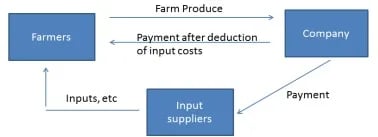Syllabus:GS3/ Agriculture
Context
- The shift from importing to exporting frozen French fries in India, highlights the importance of contract farming for both the agricultural industry and farmers.
What is Contract Farming?
- Contract farming is agricultural production carried out according to an agreement between farmers and a buyer, which places conditions on the production and marketing of the commodity.
- Farmers: They agree to produce specified agricultural commodities based on the buyer’s requirements, adhering to quality, quantity, and timing standards.
- Buyers: They are usually agribusiness firms, processors, exporters, or retailers who provide inputs like seeds, fertilizers, and technical know-how, along with a guaranteed price for the produce.
Types of contract farming arrangement
- Direct Input Provision by the Company: The company supplies all necessary inputs to the farmers, and the cost of these inputs and services is deducted from the price the farmer receives for the produce after harvest and delivery.

- Partnership with Local Input Dealers: These arrangements represent a spectrum of company involvement, balancing between direct control and reliance on third-party service providers. The choice of arrangement depends on:
- Availability of local service providers.
- The company’s resources and capabilities.
- The complexity of the crop production process.

Advantages of Contract Farming
- Assured Income: Farmers are assured of a market for their produce at a predetermined price, reducing income uncertainties.
- Access to Quality Inputs: Buyers provide high-quality seeds, fertilizers, and advanced technology, enhancing productivity and quality.
- Reduction in Post-Harvest Losses: With proper guidance and market access, post-harvest losses can be minimized.
- Facilitates Credit Access: Contracts often enable farmers to secure loans from financial institutions due to the guaranteed income stream.
Concerns associated with Contract Farming
- Power Imbalance: Farmers, particularly smallholders, may have limited bargaining power, making them vulnerable to exploitation.
- Side-Selling: Sometimes farmers sell the contracted produce to other buyers if offered a better price, breaching the agreement.
- Quality Disputes: Disagreements over quality standards lead to conflicts and delays in payments.
- Exclusion of Marginal Farmers: Buyers prefer to work with larger farmers for economies of scale, sidelining small and marginal farmers.
- Environmental Concerns: Emphasis on specific crops lead to monocropping, soil depletion, and overuse of inputs.
Government Initiatives and Legal Framework
- Model Agricultural Produce and Livestock Contract Farming and Services Act, 2018 provides a framework for fair agreements, dispute resolution, and safeguards for farmers.
- Farmer Producer Organizations (FPOs) encourage collective bargaining power for farmers in contract farming.
- e-NAM Integration: It facilitates transparency in contract enforcement and pricing.
- National Policy on Agriculture: Promotes contract farming as a means to enhance productivity and rural income.
Way Ahead
- To ensure the sustainable growth of contract farming, it is essential to focus on inclusive practices, technological advancements, and robust evaluation mechanisms.
- Contracts should be tailored to accommodate small and marginal farmers, simplifying terms and providing affordable input support.
- This inclusivity will empower underrepresented farming communities, ensuring equitable growth across the agricultural sector.
Source: IE
Previous article
News In Short 18-1-2025
Next article
ILO Report On International Migrants